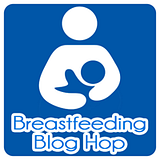Welcome to the Carnival of Tandem Nursing
This post was written for inclusion in the Carnival of Tandem Nursing hosted by Mommying My Way. Our participants have shared their personal stories of the highs the lows and information on what to expect if tandeming is in your future. Please read to the end of each post to find a list of links to the other carnival participants.
***
If I could go back seven years to the frazzled, pregnant nursing mama I was then, who was committed to child led weaning but struggling with nursing aversion, this is the advice and reassurance I would have:
Dear Mama,
It is going to be OK. Really. There is no need to feel guilty about the changes in your nursing relationship. I know you are exhausted and saddened by the shift in your breastfeeding relationship because you miss what you had before and you fear that you have ruined it forever. You haven't.
I know you are desperate to get the beauty back, those times when you both enjoyed nursing and you would smile into her eyes and she would give back a milky grin. You will. It isn't always going to be about biting your lip and fighting the urge to scream and throw things.
Your determination to keep breastfeeding? That is a good thing, because it is a choice. You are doing it because you want to, not because you feel locked into it. If that ever changes, though, you have my permission to stop. You want to teach your children to listen to their bodies, right? That means listening to yours, too.
But talk about this, OK? Find some other tandeming mamas and let them know just how hard it is. You need the support of ladies who have been here before. You are not alone. Also? Invest in good bras that *really* support, drink a ton of water and AVOID SOY AND ANYTHING ELSE THAT WILL CAUSE ESTROGEN SPIKES FOR YOU! Just trust me on this--it is a night and day difference.
Let me give you a sneak peek at some of the good things that are going to happen from tandeming:
It really does help with the transition. All four of your kiddos (yes, four!) are going to be incredibly close to each other, and seeing the gentle smiles of your two year old reaching over to hold hands or pat your newborn are going to be priceless memories. (But you won't actually nurse both of them simultaneously very often--the two different sucking patterns feels kind of weird).
Also, it is never going to be this bad again. Each subsequent pregnancy will be much easier in terms of nursing. In fact, for the next two pregnancies, you are going to be tandem nursing while pregnant and feel happy about it.
Another little tidbit: even though you won't be so uncomfortable (what a genteel way to put it, huh?) during future pregnancies, your kidlets are still going to follow a similar pattern of nursing. Just before two, they will still want to nurse several times a day. Once the baby is here, they will nurse far more than your newborn (and will go back to night nursing--breathe, mama! You can juggle two during the night, most nights anyway). IMPORTANT NOTE: you will have oversupply. Assign his and hers sides so that the baby won't be gulping from a fire hose! The constant nursing is totally OK, and if you just ride it out, they will slow down in a few months. Around three, they are going to drop to mornings and maybe once other time, and by the time four hits, they will even skip a day or two at a time. So it is OK to set limits and not feel guilty.
A few months from now, food allergies are going to rear their grotesque heads, and being able to breastfeed is going to be a comfort to you both. (Trust your instincts there, by the way--you weren't imagining things or over reacting.) Yeah, eliminating foods sucks, but it is soooooo worth it. And it isn't just food allergies. Being able to nurse through any medical issue makes it a hundred times easier.
You will really enjoy breastfeeding again, but you will also come to see it as just something you do that works for your family. By the time you are nursing three kids, you won't be thinking about it all the time, and it will just be a part of the rhythm of each day. And weaning will be a peaceful transition, too.
Most of all, don't waste any time on regrets. Guess what? Seven years from now, you will have been tandeming for six and a half years, triandeming for nearly two, having breastfed through three pregnancies and for eight and a half years continuously. And you know what? You will look back and see that the only thing you would have changed is the energy you spent in worry, fear and guilt. It is going to be OK.
Dear Mama,
It is going to be OK. Really. There is no need to feel guilty about the changes in your nursing relationship. I know you are exhausted and saddened by the shift in your breastfeeding relationship because you miss what you had before and you fear that you have ruined it forever. You haven't.
I know you are desperate to get the beauty back, those times when you both enjoyed nursing and you would smile into her eyes and she would give back a milky grin. You will. It isn't always going to be about biting your lip and fighting the urge to scream and throw things.
Your determination to keep breastfeeding? That is a good thing, because it is a choice. You are doing it because you want to, not because you feel locked into it. If that ever changes, though, you have my permission to stop. You want to teach your children to listen to their bodies, right? That means listening to yours, too.
But talk about this, OK? Find some other tandeming mamas and let them know just how hard it is. You need the support of ladies who have been here before. You are not alone. Also? Invest in good bras that *really* support, drink a ton of water and AVOID SOY AND ANYTHING ELSE THAT WILL CAUSE ESTROGEN SPIKES FOR YOU! Just trust me on this--it is a night and day difference.
Let me give you a sneak peek at some of the good things that are going to happen from tandeming:
It really does help with the transition. All four of your kiddos (yes, four!) are going to be incredibly close to each other, and seeing the gentle smiles of your two year old reaching over to hold hands or pat your newborn are going to be priceless memories. (But you won't actually nurse both of them simultaneously very often--the two different sucking patterns feels kind of weird).
Also, it is never going to be this bad again. Each subsequent pregnancy will be much easier in terms of nursing. In fact, for the next two pregnancies, you are going to be tandem nursing while pregnant and feel happy about it.
Another little tidbit: even though you won't be so uncomfortable (what a genteel way to put it, huh?) during future pregnancies, your kidlets are still going to follow a similar pattern of nursing. Just before two, they will still want to nurse several times a day. Once the baby is here, they will nurse far more than your newborn (and will go back to night nursing--breathe, mama! You can juggle two during the night, most nights anyway). IMPORTANT NOTE: you will have oversupply. Assign his and hers sides so that the baby won't be gulping from a fire hose! The constant nursing is totally OK, and if you just ride it out, they will slow down in a few months. Around three, they are going to drop to mornings and maybe once other time, and by the time four hits, they will even skip a day or two at a time. So it is OK to set limits and not feel guilty.
A few months from now, food allergies are going to rear their grotesque heads, and being able to breastfeed is going to be a comfort to you both. (Trust your instincts there, by the way--you weren't imagining things or over reacting.) Yeah, eliminating foods sucks, but it is soooooo worth it. And it isn't just food allergies. Being able to nurse through any medical issue makes it a hundred times easier.
You will really enjoy breastfeeding again, but you will also come to see it as just something you do that works for your family. By the time you are nursing three kids, you won't be thinking about it all the time, and it will just be a part of the rhythm of each day. And weaning will be a peaceful transition, too.
Most of all, don't waste any time on regrets. Guess what? Seven years from now, you will have been tandeming for six and a half years, triandeming for nearly two, having breastfed through three pregnancies and for eight and a half years continuously. And you know what? You will look back and see that the only thing you would have changed is the energy you spent in worry, fear and guilt. It is going to be OK.
***
***
- My Tandem Nursing Journey: Jenny at I'm a full-time mummy is sharing her tandem nursing journey so far...
- Built for Two: No matter how much you read and plan, things may not always go as you expect. A few things that Jennifer at True Confessions of a Real Mommy wished she knew when she was planning to tandem feed her toddler and newborn.
- Tandem Nursing - Magic Cure?: Jorje of Momma Jorje had high expectations of tandem nursing easing her toddler daughter's transition from being the baby to being a big sister.
- Mutually Desirable - Navigating a Tandem Nursing Experience: Amy Willa at www.amywilla.com talks about limit setting and meditations that help her navigate an intense tandem nursing experience.
- My Adventure in Tandem Nursing: Alicia at Lactation Narration tells her story of nursing her daughter through pregnancy and then tandem nursing.
- 4 months in: the good/hard: Becca at Exile Fertility writes about the joys and struggles of having two nurslings 17 months apart.
- Tandem Nursing: One at a Time: When tandem nursing resulted in a nursing aversion, Mandy at Living Peacefully with Children looked for ways to meet everyone's needs.
- Why Nurse a 4 Year Old?: One of the questions Dionna at Code Name: Mama keeps getting is, "but why breastfeed a four year old? What are the benefits?" Today she answers that question.
- My Hurt Feelings: Shannon at The Artful Mama shares how her first son reacted to nursing after the birth of his brother and the gift she received the last time he nursed.
- Carnival of Tandem Nursing: A Letter To Myself 7 Years Ago: Dulce de leche shares the advice and reassurance that she would have given to herself if she could go back in time.
- Nursing Both My Babies: Cassie at There’s a Pickle in my Lifeshares her experience with nursing and transitioning into tandem nursing. She also gives tips for struggles.
- Our Tandem Nursing Journey: Kim at Life-is-Learning describes her journey into tandem nursing and why it is important to her.
- Based on her own experience, Lauren at Hobo Mama dishes about the benefits and downsides to nursing multiple children.


















